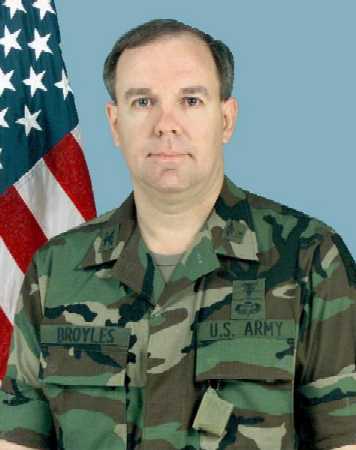


BA, Stetson Univ. 1973
MHA, Baylor Univ., Waco, TX, 1982
MMAS, U.S. Army Command & Gen. Staff College, Ft. Leavenworth, KS, 1987
Army War College, Carlisle Barracks, PA
Prog. Mgr., Information Manufacturing Co., Manassas, VA, 2003 to present
Chief Staff, North Atlantic Regional Medical Command, Washington, DC, 2001-03
Commander, 121st Gen. Hospital, Seoul, Korea, 1999-2001
Director, TRICARE Policy, OTSG, Falls Church, VA, 1995-1999
Chief, Manpower Policy Br., OTSG, Falls Church, VA, 1993-95
Commander, 93rd Evacuation Hosp, Ft. Leonard Wood, MO, 1991-93
Operations Officer, Health Services Command, Ft. Sam Houston, TX 1987-91
Exec. Off., 25th Med. BN, Schofield Barracks, HI, 1984-86
Chief, Amb. Care Spt. Div., Moncrief ACH, Ft. Jackson, SC, 1982-84
Resident, Moncrief ACH, Ft. Jackson, SC, 1981-82
Had a great group of Army, Air Force, and Navy classmates. Five of my classmates were Navy officers, three were Air Force. I worked directly with many of my classmates after the Baylor program. One Air Force classmate went on to become a Regent in ACHE for the Air Force (Steve Foster). One Navy classmate is getting an International Healthcare Award at the ACHE Congress this year (John Wocher). Even after many have retired, I still enjoy the associations of my Army classmates. Every Baylor grad has contributed significantly to his/her service and to the professional development of his/her fellow officers. My preceptor, Colonel McLain Garrett, was great, too. The residency was a super time to learn, reflect, and map the future. I had my admin residency at Fort Jackson and then stayed there two years beyond graduation and was a promotable Captain when I headed to join the Tropic Lightning Division at Schofield Barracks in 1984. I was active in the American College of Healthcare Executives even before Baylor (having been introduced to the then ACHA by an MSC who already had his MHA from a program outside of Baylor).
I have had a mix of TOE and TDA assignments believing an MSC needs to work interchangeably in both health care environments. I commanded a medical company in the Third Armored Division in Germany during my almost four-year assignment there in the mid-70's. The company command job was after assignments as a platoon leader, company XO, assistant S-3, battalion maintenance officer, and even the battalion dining facility officer. After Baylor and after attending the Command and General Staff College, I commanded a TOE hospital as a LTC. After the Army War College, I commanded a fixed hospital as a COL. I believe I have really been blessed because MSCs commanding hospitals seemed an impossible dream in the 80's. Concluding my career as an Army officer as the Chief of Staff for the North Atlantic Regional Medical Command is great. I retire effective 1 June 2003 after thirty years. Increasingly, there is little difference between military healthcare and healthcare in the private sector. The advent of TRICARE underscores the AMEDDís maintaining our military uniqueness while constantly improving our business practices and our efficiency in managing resources. Baylor graduates have been a major part of all the advances in the Military Health System. There has tended to be a tendency on the Armyís part to keep limited resources in the AMEDD and so the AMEDD presence has been less, in my view, in sheer numbers than the Navy and the Air Force. I believe we have made up for that with the Baylor acumen our people have brought to the TRICARE table.
I'm happy the Baylor program has stayed ahead of the cutting edge in healthcare admin and believe the Army-Baylor program is extraordinary. I believe the 70A community should be expanded to include more of the MSC AOCs and that young MSCs should be able to be designated Alphas earlier in their careers than most are allowed to now. Iíve had the privilege of being the preceptor for one Baylor resident (Eric Poulsen í02) and the opportunity to work with a number of others. Baylor residents and Baylor graduates are uniformly among the best the AMEDD has to offer.